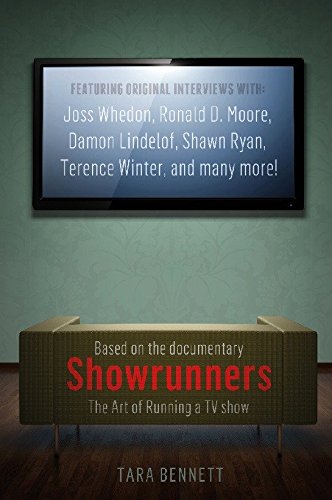
Written by Anastasia Klimchynskaya
It’s been said that we’re living in the Golden Age of Television – a fact that’s easy to believe. While Hollywood seems to be cranking out an endless number of sequels and remakes, television has truly mastered the art of storytelling – making some cutting edge stories of science fiction, fantasy, history, and human drama.
Behind each of these marvels of storytelling stands one person: the showrunner. Or so we’re told, at least. In an age when television has reached perhaps its greatest potential, the showrunner is that powerful, mysterious person in charge of every aspect of telling a story. And yet, in all the fog and mystique that shrouds this powerful figure, do we even know what exactly the showrunner even does?
That’s what Showrunners: The Art of Running a TV Show, attempts to answer. Though originally released as a documentary and its companion volume, it has only made its way to yours truly in book form. No matter, however; the tome is pretty much a documentary in book form: separated into chapters going from Showrunning 101 to dealing with networks, the politics of making TV shows, and fandom (with these chapters also separated into subsections), the entire book is made up of nothing but commentary from a variety of showrunners, gathered together for the documentary, each of whom offers their perspective on the job.
The result, of course, is that it’s about as informative as a documentary – and if you know anything about documentaries, you know that they rely on pathos, music, and pretty video clips to win over their audience as much as they do on actually being informative. Thus, though many of the formidable names (Joss Whedon, Ronald D. Moore, and Jane Espenson, among others) often provide insight into showrunning, the result is generally that, instead of getting the nitty gritty details, the information of what a showrunner’s job is like on a daily basis, or an insight into how shows are made, one simply gets a collection of different perspectives, reminiscences, and experiences. It’s interesting insofar as you care about the people interviewed and what’s going on inside their head – and less interesting if you’re not a fan of these people and just want to know what their job actually entails. If you’re a huge fan of Ronald D. Moore, you’re in luck, because this book picks his brain pretty often. If you wanted more detailed information about what a showrunner does from the minute (s)he gets up in the morning to the end of their day, they’re less in luck.
On the redeeming end, however, this book does contain a few interesting subsections particularly relevant to television today: “Women and Minority Showrunners,” as well as several sections on fandom, interacting with fans, and the Internet-o-sphere, at least touch on contemporary issues in TV-land. That, along with commentary from those showrunners I do care about, made the book engaging enough to read- but still keeps it rather far from the informative end of the spectrum. In short, it’s a book that’s likely a hit or miss based on how much one likes the showrunners included in this book, and how much information (as opposed to entertainment) one wants to get.